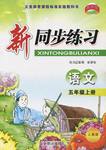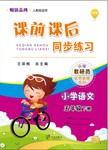题目内容
B. will stay
C. stays
D. stay

 教学练新同步练习系列答案
教学练新同步练习系列答案 课前课后同步练习系列答案
课前课后同步练习系列答案完形填空(共15小题,每小题1分,计15分)
阅读下面短文,掌握其大意,然后从各题所给的四个选项中选出一个最佳答案。
Denny Crook was a famous photographer. He traveled all over the world, taking pictures for magazines and newspapers, and won many prizes.
“I’ll do ___1___ to get a good photo,” he often said. “I’ll go anywhere at any time, even if it is dangerous.”And he told the truth. He had photos of earthquakes, forest fires, floods and even wars. If something interesting happened, Denny went to 2 it.
His wife often asked him to take her with him, but he always 3 .” I’ll travel for my work, not for 4 ,” he told her, “You won’t enjoy yourself, and I won’t have 5 to look after you. Sometimes there’s not even anywhere to 6 , and I have to sleep outside. I often don’t have a good 7 or a bath for days. You won’t like it.”
“Denny, I’m not a child,” his wife didn’t 8 , “I can look after myself. Please take me with you the next time you go overseas.”
Denny did not say anything, but he 9 about it, and when he was asked to go to Africa he said to his wife, “You can come to Africa with me if you want to. I’ll go to take photos of wild 10 there. It should be interesting and not too uncomfortable.” His wife was very 11 .
When they got to Africa, the first day she had a very enjoyable time. The next day Denny went 12 to find some lions to photo. His wife went with him, but soon they became separated (分开). She walked down one path while he walked down the other.
Suddenly, Denny heard her 13 . He ran back and saw her running toward him. A huge lion was chasing her.
Quickly Denny took his camera out of its case and 14 it at his wife and the lion. Then he shouted, “ 15 , woman! I can’t get you both in the picture!”
| 【小题1】 |
|
| 【小题2】 |
|
| 【小题3】 |
|
| 【小题4】 |
|
| 【小题5】 |
|
| 【小题6】 |
|
| 【小题7】 |
|
| 【小题8】 |
|
| 【小题9】 |
|
| 【小题10】 |
|
| 【小题11】 |
|
| 【小题12】 |
|
| 【小题13】 |
|
| 【小题14】 |
|
| 【小题15】 |
|
When you look up into the sky at night, have you ever felt that your eyes are playing tricks on (捉弄) you? It seems that the stars are moving all the time.
Actually, there is nothing wrong with your eyes. This twinkling effect is called scintillation (交光). Scintillation happens because of air movements in the earth’s atmosphere (大气). Light is “bent (弯曲的)” when it travels through different parts of the earth’s atmosphere. As the air in the earth’s atmosphere is moving all the time, the light from the stars looks as if it is moving too.
The same thing also happens to things on the ground. On a very hot and shiny day, if you look at the road, the image in the distance is not clear and things move slightly. You can also see the same effect if you drop a rock into water. The rock appears a little unclear under the moving water.
This twinkling effect causes a lot of problems for astronomers (天文学家) since they cannot observe the stars clearly. A telescope (望远镜) was sent into space so that the air movements in the atmosphere could be avoided (避免). It took a long time to build the space telescope but finally in 1990, a huge space telescope called the Hubble Space Telescope was successfully sent into space. Since then, astronomers have many important observations that have helped people understand space better.
根据短文内容,选择最佳选项。 (10分)
【小题1】What happens to the light from the stars we see when the air in the earth’s atmosphere is moving?
| A.It looks even brighter. |
| B.It looks as if it is bent. |
| C.It looks as if it is moving. |
| D.It looks like drops of rain. |
| A.rainy days | B.shiny days |
| C.cloudy days | D.windy days |
| A.The rock gets broken. |
| B.The rock becomes unclear. |
| C.The water becomes much polluted. |
| D.The water does not move anymore. |
| A.watch | B.listen | C.draw | D.explain |
| A.The stars never stay still. |
| B.It makes the stars too dark to see. |
| C.It makes astronomers feel too hot to work. |
| D.Astronomers cannot observe the stars clearly. |
Why do we come to school? Most of us may say we come to school to study. But to study needs a right way, or you either waste the time or the money. The following are the ways for studying.
The best time for reading is morning. In the morning the air is fresh and the mind is clear. For that reason we can get good results.
In studying we must have patience(耐心). If we have not known a text well, we must read it again. We should not read the next one until we have learned the first one well.
When we are studying, we must put our hearts into the books, or we can get nothing from the books while we are reading.
We must always ask “whys”. If it is not well understood, write it down and ask our teachers or our parents, brothers or friends. In any possible way, we must know it completely and what we have learned can be used well and made better.
Though there are many ways for studying, yet what I have said above will be enough if we can keep them in heart and do so.
【小题1】How many ways for studying does the passage tell us?
| A.Three | B.Four | C.Five | D.Six |
| A.we have no other work to do |
| B.we can get good results |
| C.we have slept for some hours |
| D.we may learn the next text |
| A.read very fast |
| B.read in the afternoon |
| C.don’t read it again |
| D.can’t put our hearts into it |
| A.write down the questions |
| B.read in the afternoon |
| C.understand the book better |
| D.remember what we’ve learned |
| A.save our time and money |
| B.know the importance of reading |
| C.have more patience in reading |
| D.learn about the ways for reading |
When you are about to do something brave, a cheerful wish of “Good luck!” from a friend can be helpful. But if you think you need lots of luck, what else might you do?
In the UK and US there are some strange traditions for bringing yourself a little more good luck. Some are hundreds of years old and some are much newer.
Have you heard the saying “When you wish upon a star”? If you are looking up at the sky on a clear night and you see a sudden flash of light, it is probably a shooting star! Seeing one doesn’t happen very often. The saying goes that if you see one you have been very lucky, and so if you make a wish, it will come true.
Maybe you have heard of the lucky rabbit’s foot. Some people believe that rabbits are lucky animals, so they carry a part of the rabbit, its foot, for good luck. There are all kinds of strange, unclear rules about which of the rabbit’s feet is the luckiest. It is said that this good luck tradition is the oldest one of all. However, as the funny saying goes, “Depend on the rabbit’s foot if you will, but remember it didn’t work for the rabbit!”
People in Britain love trees. If it is autumn and leaves are falling from the trees, some people try to catch the leaves as they fall because they think each leaf they catch will bring them a lucky month in the following year—they will need to catch 12 falling leaves to have a whole of good luck!
1.______ is mentioned in the oldest good luck tradition.
A. A rabbit’s foot B. A falling leaf
C. A cheerful wish from friends D. A shooting star
2.From Paragraph 3, we know that ______.
A. shooting stars can often be seen
B. people can see a shooting star on a rainy night
C. your wish may come true if you see a shooting star
D. people believe that it’s unlucky to see a shooting star
3.British people try to catch 12 falling leaves because ______.
A. the leaves fall in autumn
B. there are so many leaves to catch
C. the leaves can bring them a lucky month
D. they want to have a whole year of good luck
4.In Paragraph 5, the underlined word “them” refers to(指)______.
A. trees B. people C. leaves D. years
5.The passage is mainly about ______.
A. how to wish upon a star B. things that bring good luck
C. British people love leaves D. which of the rabbit’s feet is the luckiest